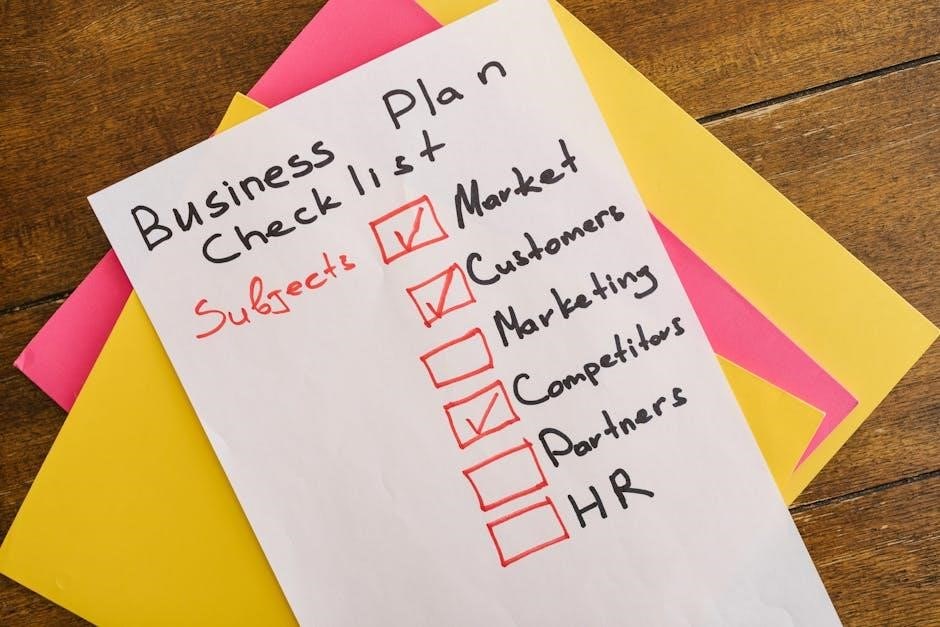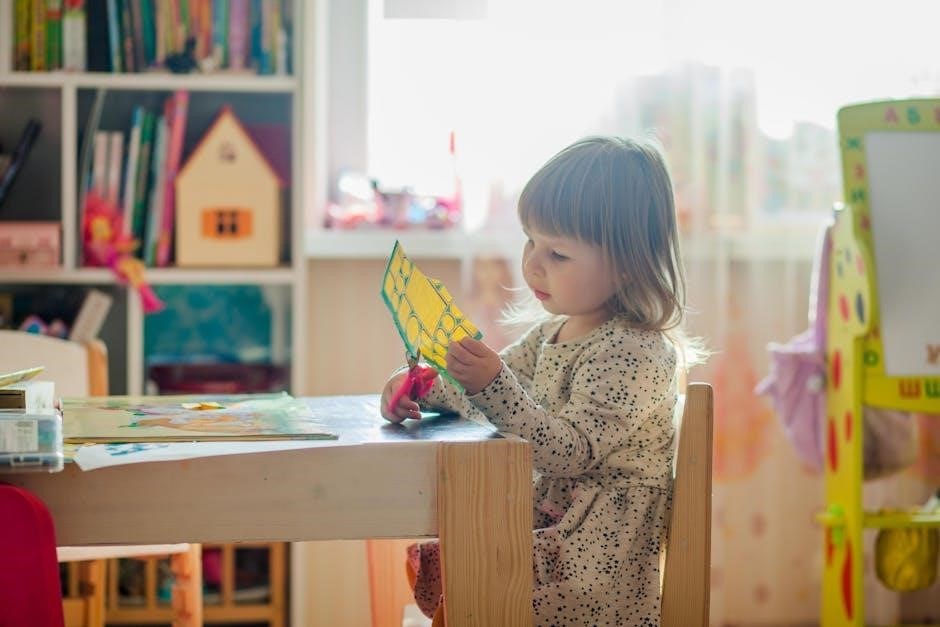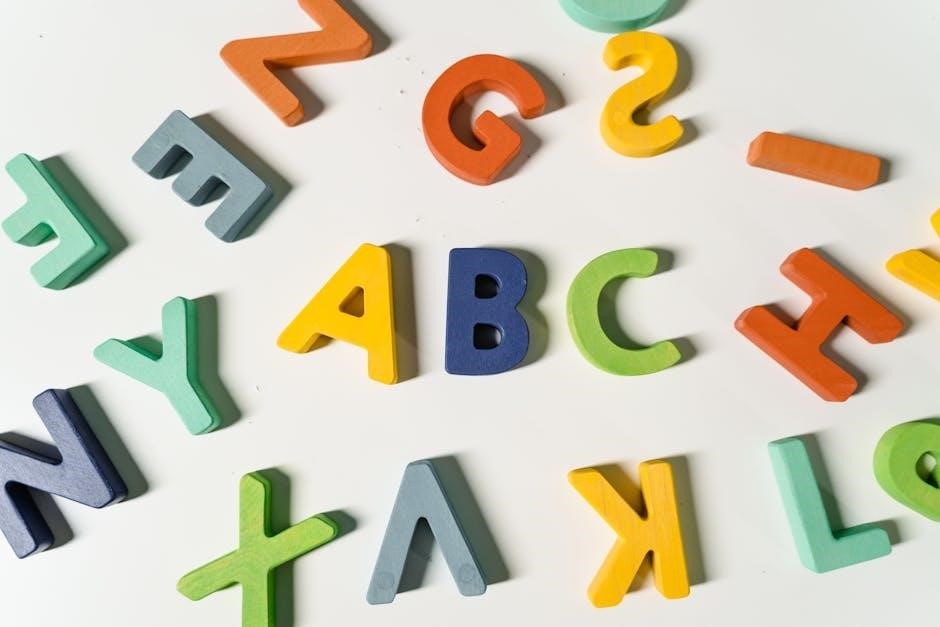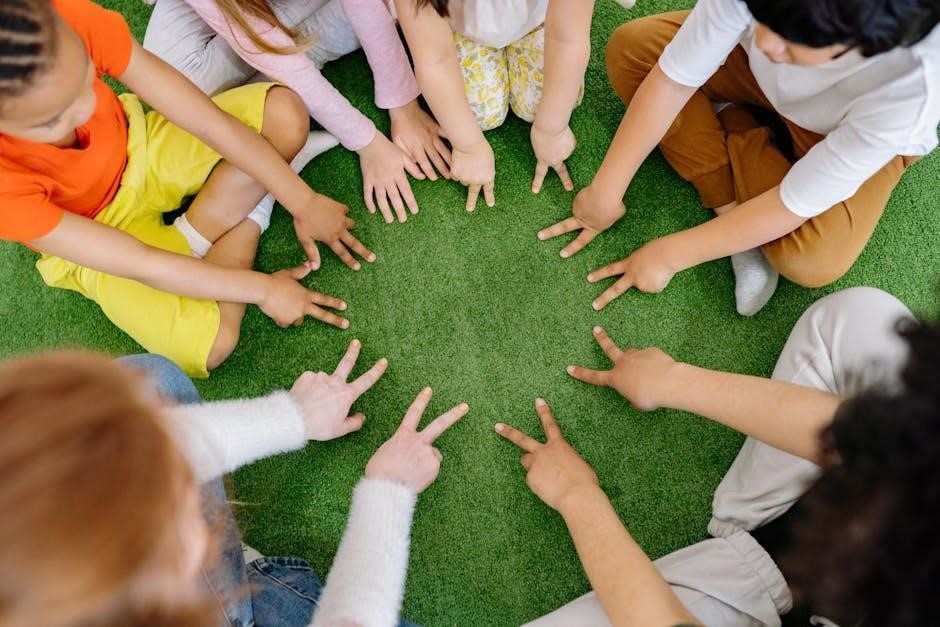The End of Kindergarten Checklist PDF is a valuable tool to assess your child’s readiness for kindergarten, covering key skills like social-emotional development, language, and motor abilities.
Overview of the End of Kindergarten Checklist
The End of Kindergarten Checklist PDF is a comprehensive tool designed to evaluate a child’s readiness for kindergarten. It covers key developmental areas such as cognitive, social-emotional, physical, and language skills. The checklist provides a structured format for parents and educators to assess a child’s abilities, identify strengths, and pinpoint areas needing improvement. Available in both PDF and printable formats, it offers a clear framework for tracking progress and preparing children for a successful transition to kindergarten. This resource is essential for ensuring children are well-prepared academically and socially.
Importance of Assessing Readiness for Kindergarten
Assessing readiness for kindergarten is crucial for ensuring a smooth transition and identifying areas where support may be needed. It helps parents and educators understand a child’s developmental stage and prepare them for the challenges ahead. By evaluating cognitive, social-emotional, and physical skills, the checklist provides insights into a child’s strengths and areas for growth. Early assessment allows for targeted support, fostering confidence and setting a strong foundation for future academic success. It also helps create realistic expectations and ensures children are emotionally and academically prepared for kindergarten.
How to Use the End of Kindergarten Checklist PDF
The End of Kindergarten Checklist PDF is designed to be user-friendly. Parents and educators can download and print it, then systematically check off each skill as a child demonstrates mastery. The checklist is organized into categories such as cognitive, social-emotional, and physical skills, making it easy to track progress. By focusing on specific areas, users can identify strengths and areas needing attention. Regular use allows for monitoring development over time and setting goals for further growth. This tool is a practical way to prepare children for the next educational step with confidence and readiness.
Key Skills to Assess Before Kindergarten
Assessing a child’s readiness involves evaluating cognitive, social-emotional, physical, and language skills. These areas ensure a smooth transition to kindergarten and future academic success.
Cognitive and Academic Skills
Cognitive and academic skills are foundational for kindergarten success. These include counting up to 10 or 20, recognizing shapes and colors, and identifying objects. Basic math concepts like addition and subtraction are also essential. Children should demonstrate an understanding of numbers and their relationships. Language skills, such as naming letters and sounding out simple words, are critical. Problem-solving abilities, like sorting objects by shape or color, showcase logical thinking. Memory and attention skills, such as recalling sequences or focusing on tasks, are also vital. These skills lay the groundwork for future academic achievements.
Social-Emotional Development
Social-emotional development is crucial for kindergarten readiness. This includes self-awareness and confidence, cooperation with peers, and emotional regulation. Children should demonstrate empathy and understanding of others’ feelings. They should be able to express their own emotions and needs effectively. Playing well with others and showing kindness are key indicators. Emotional resilience, such as coping with challenges, is also important. These skills help children build positive relationships and navigate social interactions confidently, setting a strong foundation for their educational journey.
Physical and Motor Skills
Physical and motor skills are essential for kindergarten readiness. Gross motor skills include running, jumping, hopping, skipping, and maintaining balance. Fine motor skills involve using scissors, holding crayons, and dressing independently (e.g., buttoning, zipping, tying shoes). Hand-eye coordination, such as catching a ball or throwing accurately, is also important. These abilities enable children to participate in playground activities, complete classroom tasks, and develop overall physical confidence, laying the groundwork for success in kindergarten and beyond.
Language and Communication Skills
Language and communication skills form the foundation for effective learning and social interaction. Verbal communication involves speaking clearly, expressing thoughts, and using complete sentences. Listening and comprehension skills are crucial, enabling children to follow instructions and engage in conversations. Additionally, identifying and naming alphabet letters, recognizing rhyming words, and describing differences between objects or characters in stories are key indicators of readiness. These skills help children participate actively in classroom activities, understand instructions, and build strong relationships with peers and teachers.
Cognitive and Academic Skills in Detail
Cognitive and academic skills are essential for kindergarten readiness. These include problem-solving, memory, and attention. Recognizing shapes, colors, and numbers, along with basic math concepts like counting and sorting, are foundational. Children should demonstrate an understanding of sequences and patterns, as well as the ability to follow simple instructions and complete tasks independently. These skills form the basis for future academic success and are critical for a smooth transition into structured learning environments.
Math Skills
Math skills are fundamental for kindergarten readiness. Children should demonstrate the ability to count up to 10 or 20, recognize basic shapes, and identify common colors. They should understand sequences, such as big/small or hot/cold, and show an awareness of numbers in their environment. Basic math concepts, like sorting objects by size or color and recognizing patterns, are essential. Additionally, children should begin to understand simple number relationships, such as “one more” or “one less,” and demonstrate an interest in problem-solving activities. These skills build a strong foundation for future math abilities and logical thinking.
Language and Literacy
Language and literacy skills are critical for kindergarten success. Children should recognize and name uppercase and lowercase letters, understand letter sounds, and demonstrate phonological awareness. They should engage in pretend reading, retell simple stories, and identify the front and back of a book. Recognizing their name in print and understanding basic story structure, such as beginning, middle, and end, are also key. These skills lay the groundwork for decoding words and fostering a love for reading, which are essential for future academic achievement and lifelong learning.
Problem-Solving Abilities
Problem-solving abilities are essential for kindergarten readiness. Children should demonstrate logical thinking by recognizing patterns, sorting objects by shape and color, and understanding cause-and-effect relationships. They should also show an ability to approach challenges with curiosity and persistence. Simple math concepts, such as counting up to 20 and basic addition or subtraction, further enhance their problem-solving skills. These abilities help children navigate everyday situations and build a strong foundation for future academic success and independent learning.
Memory and Attention
Assessing memory and attention skills is crucial for kindergarten readiness. Children should demonstrate the ability to follow simple directions, recall sequences, and focus on tasks. They should identify and name basic shapes, colors, and objects, showing an understanding of familiar routines. These skills lay the foundation for learning and social interactions, helping children engage effectively in classroom activities and build confidence in their abilities. The checklist evaluates these competencies to ensure a smooth transition into formal education.
Social-Emotional Development
Social-emotional development focuses on self-awareness, cooperation, emotional regulation, and empathy. These skills help children navigate relationships, manage feelings, and build confidence, essential for kindergarten success.
Self-Awareness and Confidence
Self-awareness and confidence are critical for kindergarten readiness. A child should demonstrate an understanding of their identity, such as recognizing their name, age, and personal attributes. They should express feelings verbally and show pride in accomplishments. Confidence is built through independence in completing simple tasks, like dressing or using the bathroom. Recognizing strengths and limitations also fosters self-awareness. Encouraging self-expression and praising efforts helps children develop a positive self-image, essential for social and academic success in kindergarten.
Cooperation and Sharing
Cooperation and sharing are essential social skills for kindergarten readiness. A child should demonstrate willingness to share toys, take turns, and engage in group activities. They should show an understanding of empathy and respect for others’ feelings. Encouraging cooperation through play helps build positive relationships and teaches conflict resolution. Sharing and collaborating with peers fosters a sense of community and teamwork, which are vital for a smooth transition into kindergarten. These skills lay the foundation for social success and classroom harmony.
Emotional Regulation
Emotional regulation is crucial for kindergarten success. A child should demonstrate the ability to recognize and manage their feelings, expressing emotions appropriately. They should begin to calm themselves after upsets and show resilience in the face of challenges. Teaching strategies like deep breathing or counting can help. Positive reinforcement for calm behavior encourages healthy emotional development. A child who can regulate emotions is better equipped to handle the social and academic demands of kindergarten, fostering a positive and confident start to their educational journey.
Empathy and Understanding Others
Empathy and understanding others are key social skills for kindergarten readiness. A child should show compassion and awareness of others’ feelings, comforting peers when upset. They should engage in cooperative play, sharing toys and taking turns. Recognizing different emotions in others and responding appropriately fosters positive relationships. Encouraging discussions about others’ perspectives helps develop this skill. A child with empathy is better prepared to build friendships and navigate social interactions confidently in a kindergarten setting.

Physical and Motor Skills
Physical and motor skills are essential for kindergarten readiness. These include gross motor abilities like running and jumping, as well as fine motor skills like using scissors and buttoning shirts.
Gross Motor Skills
Gross motor skills are fundamental for kindergarten readiness, involving large muscle groups. These skills include hopping, skipping, jumping, and maintaining balance. Climbing and walking up and down stairs with ease are also key indicators. By the end of kindergarten, children should demonstrate coordination in activities like running, kicking a ball, and throwing overhead. These abilities reflect physical development and readiness for more complex movements in subsequent grades. Mastering these skills contributes to overall confidence and preparedness for the physical demands of school.
Fine Motor Skills
Fine motor skills are essential for kindergarten readiness, focusing on precise movements using hands and fingers. These skills include cutting with scissors, drawing simple shapes, and coloring within lines. By the end of kindergarten, children should be able to button shirts, zip jackets, and tie shoelaces. They should also demonstrate the ability to hold pencils and crayons correctly, write their name legibly, and manipulate small objects like beads or puzzle pieces. These abilities are crucial for tasks like writing and self-care, ensuring readiness for more advanced activities in subsequent grades.
Hand-Eye Coordination
Hand-eye coordination is a critical skill for kindergarten readiness, involving the ability to track moving objects and use hands in sync with visual cues. Children should be able to catch a ball, throw with accuracy, and track objects like a rolling ball or a flying disc. They should also demonstrate the ability to clap hands to a rhythm, move objects from one hand to another, and complete tasks requiring precise timing. These skills are vital for activities like catching, throwing, and participating in physical games, laying the groundwork for future motor development.

Language and Communication Skills
Language and communication skills are essential for kindergarten success. Children should use complete sentences, identify sounds, and understand stories. These skills enhance verbal and non-verbal interactions.
Verbal Communication
Verbal communication is a cornerstone of kindergarten readiness. The checklist evaluates a child’s ability to clearly express thoughts, use proper grammar, and engage in meaningful conversations. It also assesses their capacity to listen actively and respond appropriately. Children should demonstrate an understanding of tone and context, as well as the ability to describe events or explain ideas. Strong verbal skills foster social interactions, academic engagement, and emotional expression, making them a critical focus for kindergarten preparation.
Listening and Comprehension
Listening and comprehension skills are essential for kindergarten success. The checklist evaluates a child’s ability to follow simple directions, understand spoken stories, and identify main ideas. It also assesses their capacity to recognize key details, sequence events, and respond to questions about what was heard. These skills are fundamental for learning, social interactions, and academic tasks. The checklist helps parents and educators track progress and ensure children are prepared to engage effectively in a classroom environment, fostering improved focus and confidence in their daily activities.
Expressing Thoughts and Needs
Expressing thoughts and needs is a critical skill for kindergarten readiness. The checklist evaluates a child’s ability to communicate ideas clearly, use complete sentences, and convey emotions effectively. It also assesses their capacity to describe events, share opinions, and articulate needs in a socially appropriate manner. This skill fosters independence, problem-solving, and healthy social interactions. By mastering these abilities, children can confidently express themselves, engage in meaningful conversations, and build strong relationships with peers and teachers, laying a solid foundation for future academic and personal growth.

Preparing for the Transition to Kindergarten
Preparing for kindergarten involves establishing routines, fostering independence, and building resilience to help children adapt smoothly to the new learning environment and social interactions.
Creating a Routine
Establishing a structured daily schedule helps children transition smoothly to kindergarten. Include activities like recognizing shapes, colors, and numbers, while fostering social-emotional growth through group play. Consistent routines build confidence and resilience, preparing children for the classroom environment and academic expectations ahead. Use the checklist to track progress and identify areas needing attention, ensuring a strong foundation for future learning and development. A predictable routine also aids in emotional regulation, a key skill for kindergarten success.
Encouraging Independence
Encouraging independence is crucial for kindergarten readiness. Teach your child to dress themselves, use the bathroom, and complete simple tasks like putting away toys. Provide opportunities for them to make choices, such as selecting clothes or snacks, fostering decision-making skills. Encourage self-reliance by allowing them to attempt tasks independently, even if it takes longer. Praise efforts to build confidence and self-esteem. This prepares them for classroom expectations and helps develop problem-solving abilities, essential for academic and social success in kindergarten.
Building Resilience
Building resilience helps children handle challenges confidently. Encourage your child to attempt tasks independently, even if they struggle. Praise effort, not just success, to foster a growth mindset. Teach problem-solving skills by guiding them to think through solutions. Discuss emotions and coping strategies to help them manage frustrations. Positive reinforcement and supportive environments nurture resilience, equipping your child to adapt to kindergarten’s demands and beyond. Resilience is key for academic and social success, helping children bounce back from setbacks with confidence and determination.

How to Use the End of Kindergarten Checklist
Download and print the PDF to assess your child’s readiness. Review each category, track progress, and identify areas for growth. Use it to guide activities and prepare for kindergarten effectively.
Step-by-Step Guide to Completing the Checklist
Print the End of Kindergarten Checklist PDF and review each category.
Assess your child’s abilities by checking off skills they have mastered.
Identify areas where your child may need additional support or practice.
Create a plan to address gaps, using recommended activities or resources.
Track progress over time to monitor growth and development.
Discuss the results with teachers or caregivers to align strategies.
Use the checklist as a tool for open communication about your child’s readiness.
Interpreting the Results
Review the completed End of Kindergarten Checklist PDF to identify strengths and areas for growth.
Skills checked off indicate mastery, while unchecked items highlight needs for further development.
Focus on progress rather than perfection, as readiness is a continuum.
Use the results to guide conversations with teachers or caregivers.
Celebrate achievements and create targeted strategies for improvement.
Remember, the checklist is a tool to support growth, not a test of readiness.
Setting Goals for Further Development
Based on the End of Kindergarten Checklist PDF results, identify areas needing attention and create specific, achievable goals.
Break larger skills into smaller, manageable steps to build confidence and ability.
For example, if your child struggles with shape recognition, practice identifying and naming shapes daily.
Set realistic timelines for mastering each skill and track progress.
Involve teachers or caregivers to align goals with classroom expectations.
Celebrate small milestones to motivate your child and reinforce their efforts.
Adjust goals as needed to ensure continuous growth and development.
Additional Resources
Explore printable checklists, recommended books, and online tools to support your child’s development. Utilize activity guides and educational apps to reinforce learning and prepare for kindergarten confidently.
Recommended Activities for Skill Development
Engage your child in activities that promote learning and fun, such as puzzles for problem-solving, rhyming games for language skills, and counting exercises for math readiness. Encourage creative play to foster social-emotional growth and independence. Use flashcards for alphabet recognition and shape sorting for fine motor skills. Reading aloud daily helps build literacy, while outdoor play enhances gross motor abilities. Incorporate art projects to express creativity and develop hand-eye coordination. These activities, aligned with the checklist, ensure a well-rounded approach to kindergarten preparation.
Books and Materials for Kindergarten Preparation
Use age-appropriate books and educational materials to support your child’s development. Alphabet and number flashcards, shape-sorting toys, and early reader books are excellent tools. Workbooks focusing on tracing letters and basic math can enhance fine motor and academic skills. Interactive learning apps and puzzles also promote problem-solving abilities. Consider materials like “The Kindergarten Readiness Workbook” or “First Skills for Kindergarten” to align with the checklist. These resources provide engaging and structured ways to build confidence and a strong foundation for learning.
Online Tools and Apps
Enhance your child’s preparation with educational apps and online tools designed for kindergarten readiness. Apps like ABCmouse and Khan Academy Kids offer interactive games and activities that focus on math, reading, and problem-solving. Many platforms provide progress tracking, allowing you to identify areas for improvement. Additionally, websites like Starfall and PBS Kids offer free resources, including interactive reading exercises and puzzles. These tools make learning fun and engaging, helping your child build confidence and essential skills before entering kindergarten.
Thank you for your attention to preparing your child for kindergarten. Use the End of Kindergarten Checklist PDF to assess their readiness and guide their preparation effectively.
Final Thoughts on Kindergarten Readiness
The End of Kindergarten Checklist PDF is an essential tool for assessing a child’s readiness, focusing on cognitive, social-emotional, physical, and language skills. It helps identify strengths and areas needing attention, ensuring a smooth transition to formal education. By using this checklist, parents and educators can collaboratively prepare children, fostering confidence and resilience. Remember, no child needs to master every skill, but a balanced development across key areas sets the foundation for future success. This checklist is not just an assessment but a guide for nurturing growth and readiness.
Encouragement for Parents and Caregivers
Supporting your child’s transition to kindergarten is a significant milestone, and your role is invaluable. Use the End of Kindergarten Checklist PDF to guide your efforts, celebrating progress and addressing areas for growth. Encourage independence, resilience, and curiosity while fostering a love for learning. Collaborate with educators and embrace this journey with patience and positivity. Every small step contributes to your child’s confidence and readiness for the adventures ahead. Remember, you are your child’s first and most influential teacher—cherish these moments and celebrate their growth.

About the Author
The author is an experienced educator specializing in early childhood development, with a focus on kindergarten readiness. Holding a degree in Education, they have crafted the End of Kindergarten Checklist PDF to provide parents and educators with a comprehensive tool for assessing and fostering essential skills. Their expertise in curriculum design and child development ensures the checklist is both practical and insightful, helping children transition smoothly to kindergarten. The author’s goal is to empower families and teachers with resources that promote confidence and readiness for young learners.
